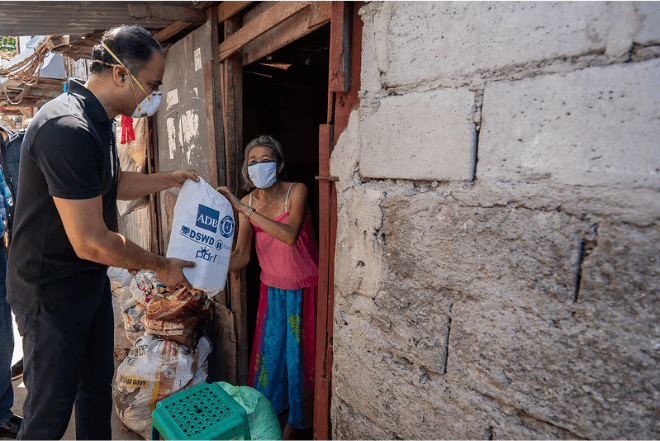
The Asian Development Bank (ADB) set aside a record $31.6 billion in 2020 to help Asia and the Pacific fight the coronavirus disease (COVID-1); support a green, sustainable recovery from the pandemic; and address longer-term development challenges.
“ADB’s assistance is bolstering health systems, protecting vulnerable groups, supporting small businesses, and laying the path for recovery,” said ADB President Masatsugu Asakawa in a statement. “Looking ahead, as we support the region in its recovery from the pandemic, we will ensure that our DMCs [developing member countries] rebuild smartly and sustainably.”
The $31.6 billion ADB committed from its own resources in 2020 was 32% higher than 2019’s $24.0 billion, comprising loans and guarantees—including short-term trade finance, supply chain finance, and microfinance—grants, equity investments, and technical assistance, both to governments and to the private sector.
Just over half of ADB’s 2020 commitments, $16.1 billion, was targeted for pandemic response, and the rest was for helping DMCs address the long-term development agenda, such as advancing gender equality, tackling climate change, and investing in quality infrastructure.
Southeast Asia response
For Southeast Asia alone, ADB committed $11.63 billion, of which $7.04 billion was targeted toward countries’ COVID-19 response. This was 61.9% more than its commitments in 2019.
In its 2020 annual report, ADB noted that the pandemic had hurt most of the economies of Southeast Asia as economic activities slowed due to widespread restrictions to curb the spread of the virus. Economies faltered despite governments spending more than $400 billion (13.2% of gross domestic product) in stimulus to support businesses and vulnerable sections of the population.
ADB’s pandemic support to Southeast Asia focused on bolstering health-care systems to help save lives, providing relief for the poorest and most vulnerable suffering dire economic hardship, and addressing the devastating impacts of COVID-19 on businesses and economies.
To provide governments with guidance on their economic stimulus policies and programs, ADB prepared COVID-19 response assessments for individual DMCs, with a focus on measures to support post-pandemic recovery.
Wider Asia support
Among ADB’s early response to Asia and the Pacific included a $20 billion package announced in April 2020, which provided quick-disbursing fiscal support to 26 countries by the end of the year.
In December 2020, ADB also launched a $9-billion facility to support access to safe and effective COVID-19 vaccines and their equitable and efficient delivery. ADB recently signed a $425-million loan for the Philippines and $450 million for Indonesia. ADB also provided grants to Afghanistan and Pacific countries, under the facility. Fourteen additional projects, worth more than $3.8 billion, are in the pipeline.
In an address during the recently concluded ASEAN+3 Finance Ministers’ and Central Bank Governors’ Meeting on 3 May, Mr. Asakawa however noted that supply shortages are limiting vaccine availability in the region.
He said ADB recently revised its vaccine eligibility criteria so that vaccines can be procured swiftly from more diverse sources, while also ensuring safety and efficacy aligned with the World Bank and COVAX, the global initiative that aims to provide COVID-19 vaccines to the developing world.
“Enhancing the vaccine production capacity is imperative to mitigate this demand-supply gap issue, and we must expand investment in vaccine manufacturers in the region, including in Korea, Indonesia, Thailand, and Viet Nam,” he said.

